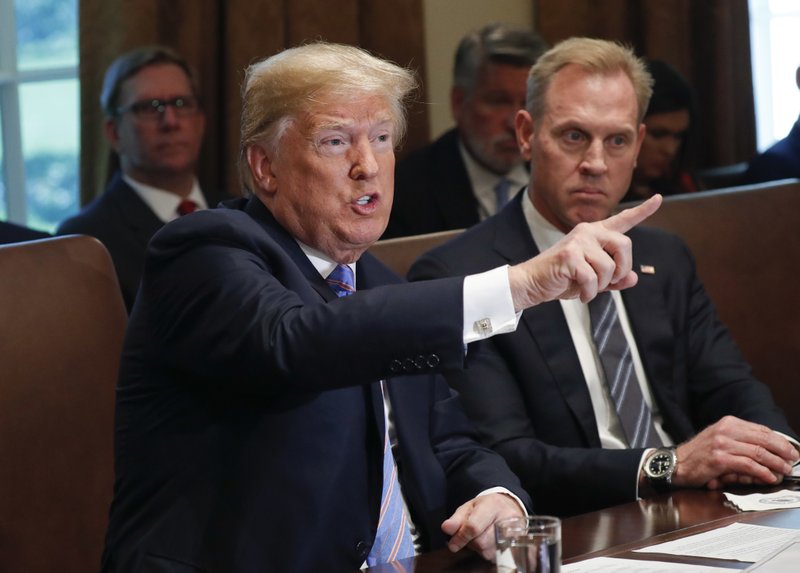WASHINGTON — President Donald Trump "disagrees" with Russian President Vladimir Putin's offer to allow the U.S. to question 12 Russians accused of interfering in the 2016 election in exchange for permitting Russia to interview Americans the Kremlin accuses of unspecified crimes, the White House said Thursday.
White House press secretary Sarah Huckabee Sanders said the proposal was "made in sincerity" by Putin, but Trump "disagrees with it." She said the U.S. hopes Putin will have the Russians indicted on charges brought by the U.S. Department of Justice "come to the United States to prove their innocence or guilt."
In an afternoon of swift Washington political stagecraft, the White House rejected Putin's offer as the Republican-controlled Senate prepared to issue a rebuke to Trump by going on record against it. After Trump backed down, the Senate approved a nonbinding resolution opposing it by a vote of 98-0.
Putin made what Trump called an "incredible offer" during a joint press conference concluding their summit in Helsinki, for which Trump received bipartisan condemnation at home.
The White House had said Wednesday it was under consideration, even though the State Department called Russia's allegations against the Americans "absurd." In an interview with The Christian Broadcasting Network on Thursday, Secretary of State Mike Pompeo said, "that's not going to happen."
"The administration is not going to send, force Americans to travel to Russia to be interrogated by Vladimir Putin and his team," Pompeo said.
The Russian claims against the Americans, including former U.S. Ambassador to Russia Michael McFaul, involve allegations of fraud and corruption. Congressional Republicans have criticized the White House for even considering the offer, while McFaul has called it a "ridiculous request from Putin."
Pushing back against criticism of his Putin meeting, Trump said Thursday he wants another meeting with Putin to start implementing ideas they discussed in Helsinki, casting the summit as a starting point for progress on a number of shared concerns.
The Fake News Media wants so badly to see a major confrontation with Russia, even a confrontation that could lead to war. They are pushing so recklessly hard and hate the fact that I’ll probably have a good relationship with Putin. We are doing MUCH better than any other country!
— Donald J. Trump (@realDonaldTrump) July 19, 2018
Trump also accused the news media of trying to provoke a confrontation with Moscow that could lead to war, although concerns about the meeting have been raised by a broad cross-section of Republicans and Democrats.
Trump tweeted a list of topics discussed at the summit, including terrorism, security for Israel, Mideast peace, Ukraine, North Korea and more, and wrote: "There are many answers, some easy and some hard, to these problems... but they can ALL be solved!"
"I look forward to our second meeting so that we can start implementing some of the many things discussed," he wrote. Trump also met with Putin last year in Germany and Vietnam.
Trump pointed blame at the media, tweeting: "The Fake News Media wants so badly to see a major confrontation with Russia, even a confrontation that could lead to war. They are pushing so recklessly hard and hate the fact that I'll probably have a good relationship with Putin. We are doing MUCH better than any other country!"
"The Summit with Russia was a great success, except with the real enemy of the people, the Fake News Media," he tweeted.
Numerous lawmakers have criticized Trump for his post-summit statements raising doubts about Russia's interference in the 2016 U.S. elections, and past and current intelligence community officials also differed with many of his statements.
Sen. Lindsey Graham, R-S.C., acknowledged Thursday that Trump has had a "bad week" on Russia.
"I think it's imperative that he understand that he's misjudging Putin," Graham told reporters. "I don't think he was prepared as well as he should have been."
Graham said Trump was right to criticize previous administrations for their handling of Russia. But he said Trump "is not making the problem better, he's making it worse."
Putin, in his first public comments about the summit, told Russian diplomats Thursday that U.S.-Russian relations are "in some ways worse than during the Cold War," but that the meeting with Trump allowed them to start on "the path to positive change."
"We will see how things develop further," Putin said, evoking unnamed "forces" in the U.S. trying to prevent any improvement in relations and "putting narrow party interests above the national interest."
Trump had toughened his tone about Russia on Wednesday, saying in a CBS News interview that he told the Russian president to his face during Monday's summit to stay out of America's elections "and that's the way it's going to be."
That rhetoric marked a turnabout from Trump's first, upbeat description of the sit-down. Still, Trump backtracked on whether Russia is currently targeting U.S. elections. Asked the question Wednesday, his "no" answer put him sharply at odds with recent public warnings from his own intelligence chief.
Hours later, the White House stepped in to say Trump's answer wasn't what it appeared.
Read Friday's Arkansas Democrat-Gazette for full details.
